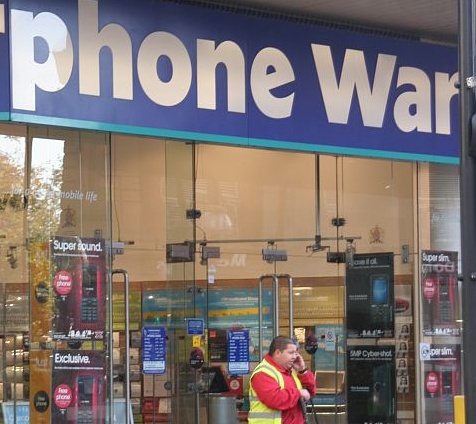I think the answer here is no. We've got two ecosystems that you could argue are the heavyweights that have broken away from the pack, but a peloton close behind them which could be considered the third player, depending on your criteria and which region of the world you're discussing.
Let's start with the two obvious heavyweights, and the first shouldn't be a surprise. Symbian OS (with S60). The partnership of Symbian OS and the S60 interface is the biggest selling smartphone operating system by a country mile, with hundreds of phones from a number of manufacturers. It has strong support from operators, a decent level of third party app support and is in some of the biggest selling devices around. You might disagree with their current strategy or past decisions, but from an empirical level you cannot argue with their inclusion.
Neither could you ignore the iPhone. Selling in multiple millions, the consumer friendly phone that has brought the mobile internet to the majority of users, it opened the eyes of many (and the majority of the American mobile market) to what a mobile connected device could do. As with Symbian, there are a number of issues that you could pick up about the iPhone depending on your viewpoint, but on emotional impact on the market and the ability to nurture a closed ecosystem, Apple's iPhone OS takes the second slot.
The third slot though is the one where I think people are going to be arguing, because there isn't a clear winner. My first instinct was to go with Google's Android OS, which has built up a good online reputation. But online reputation is not the only mark of success. Handsets are still relatively thin on the ground and the support from network operators is patchy at best. Android may be a strong medium to long term 'buy' prospect, but right now it's relying on the Google name to be lofted above others, and that's not enough.
Another OS trading on a name and reputation is Palm and their new WebOS. It's currently a US-only device, and there's no indication yet that it is doing stellar sales. I also recall a number of bar charts when Palm (née PalmOne, née err.... Palm) was doing strong business on the Treo. They had a nice percentage of sales in the US, but nothing anywhere else in the world. Do strong sales in one region (admittedly one region that has the lions share of tech web sites) enough to be one of the 'three'?
Probably not, which means the other Symbian OS candidate, DoCoMo in Japan, can't make the top division either, but it's probably a stronger approach than looking at just the sales figures... because if raw numbers was the only factor then we'd have to consider Nokia's bespoke OS Series 40. It's got a web browser, it can handle rich messaging, third party applications and Web 2.0 tools, so why shouldn't it be there? Because it's old. Because it was never meant to be extended the way it has been? Because it's not in the flagship phones?
And then there is the enterprise focus that are Research in Motion's Blackberries and the various Windows Mobile devices. They may no longer be the darlings of the geekerati but these workhorses still do the job in the corporate world... the number of Blackberry devices I saw with agents and PR people at the Edinburgh Fringe is testament to that. But are they still heavyweights? I'd probably say no on the part of Microsoft, they're firmly in the second division, but Research in Motion are definitely fighting for the final promotion spot.
It's clear that one of the big factors is geography – the three top choices in Japan would likely be far different to North America, with a European three somewhere in the middle of that. I also don't think that any of the smartphone OS's would be able to be in the top three in each of those three areas – the iPhone isn't a significant player in the Far East; S60 has not made an impact in the North American market; Palm's WebOS is effectively in start-up mode and focusing on the US; and of course the smaller players are all looking to expand while the leading companies need to keep innovating to maintain their position.
All the talk that there is a victor in the smartphone market is just that. Talk. There is a natural ebb and flow and right now, some companies are on the rise, and some are on the wane. Will those waning companies be replaced, or will they pick up again, either with an updated OS or something brand new? Or is there something in stealth mode just round the corner that's going to surprise us all? I can't wait to find out.
– Ewan Spence, Sept 2009.

